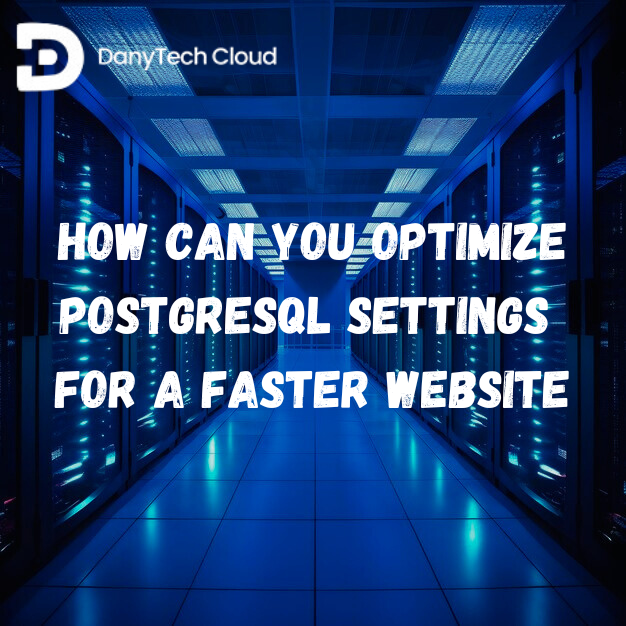
Performance optimization is a significant aspect of managing any web application that depends on a relational database system such as PostgreSQL. It is important because an efficient database operation directly impacts the user experience, speed, and reliability of web apps.
What is PostgreSQL Performance Optimization?
PostgreSQL performance optimization is a procedure where you change the configuration in an effort to achieve better performance out of your database. This requires an in-depth understanding of how the database works. Tuning for PostgreSQL maintenance and performance is not like tuning other databases. This is so because you can turn on each schema for a different performance metric with PostgreSQL on the basis of the use case. For instance, it may be frequent reads or frequent writes.
Why Optimize PostgreSQL?
There are multiple reasons why optimizing a PostgreSQL is necessary, including faster website performance.
- Improved Application Speed and Responsiveness
When your database processes queries fast, it also allows your web app to quickly serve content to users. Such responsiveness is crucial for user satisfaction and retention. This is specifically for dynamic sites where data is continuously updated and retrieved. You can also get a PostgreSQL dedicated hosting service, which will help you resolve your speed problems.
- Scalability
Your web app grows eventually either in the user base or data volume. Fine-tuning PostgreSQL for web applications with an optimal setting will ensure that your database can handle enhanced loads without any compromise on performance.
- Cost Efficiency
Like a PostgreSQL shared hosting service, optimizing PostgreSQL can also be affordable. When there is efficient use of resources, there will also be reduced operational costs. An optimized database will utilize hardware resources more efficiently. Hence, it will potentially lower the demand for expensive scale-ups.
- Consistency and Reliability
Proper database optimization allows you to maintain the consistency and integrity of data. It is crucial for transactional apps and systems that depend heavily on real-time and accurate data. How to
Optimize PostgreSQL Database Performance?

If you are considering, “What are the recommended settings for PostgreSQL?”, then read along for answers.
There are many ways you can optimize a PostgreSQL database’s performance. It critically depends on the use case; therefore, it is important to know what you want before you start.
Database Design
You may consider that the difference between PostgreSQL vs MySQL will cause a difference in database design. However, database designing is arguably one of the most crucial steps in improving any database performance, not only PostgreSQL.
Since PostgreSQL provides relational database properties, you can easily distribute the data into multiple logically separated tables rather than having a single big table. This often shows significant and immediate improvement in query performance.
Another obvious and common method to optimize PostgreSQL performance is to have sufficient indexes. This also relies heavily on the queries you will be running often and the use case. The purpose here is to filter as much data as you can so that there is less data to work with. So, build the indexes on columns that are commonly used as filters in the most frequently run queries.
Although PostgreSQL index optimization techniques also help to enhance query performance, ensure that you use them with caution. If you overuse the indexes, it will cause adverse or negative effects. Remember that creating and maintaining indexes is an expensive operation. Creating too many indexes will decline the overall performance of the database.
Hardware Tuning
There is definitely a part of the underlying hardware in optimizing the PostgreSQL performance. Developers should consider PostgreSQL configuration for faster websites, partitioning, indexing, and hardware capacity while designing queries. Here are four major hardware aspects and how they impact PostgreSQL performance.
- CPU
The CPU plays a significant role in the performance of PostgreSQL queries. Complex computations and operations require CPU time. These may be joins, aggregations, sorting, grouping, hashing, etc., along with CPU time. The CPU must also be capable enough to monitor such tasks. It is expensive to scale up the CPU, so you should do a detailed analysis of the effect of the CPU on performance before upgrading the CPU. Moreover, you can also optimize the query with PostgreSQL query optimization tips to make the most out of the existing CPU.
- RAM
Memory or RAM is essential for databases to run properly. Whenever you submit a query, the data is initially brought into memory and then goes through any grouping, sorting, aggregation, etc. You will find reduced I/O operations and increased disk cache with increased memory on the disk. This enhances PostgreSQL query performance critically, as I/O operations are much more costly than operations in memory. Make sure to have a little more memory than required.
On the other hand, if you do not have enough memory, then your queries could be killed with an exception “out of memory”. Or, it may also kill running processes to accommodate your queries.
- Disk I/O
All your data resides in a hard disk. So when you submit a query, the data is first read from the disk and then loaded into memory. Likewise, when there is a write operation, the data should be written to disk from memory.
Optimizing PostgreSQL read and write operations can significantly enhance the performance of a PostgreSQL query. It is done as the data can be immediately loaded into the memory or immediately offloaded from memory. If there are major I/O operations on the database, a good idea is to physically store every tablespace on another disk drive. It helps the disk not be overloaded with I/O operation requests.
- Network
Optimizing the network may not seem to be that essential in the beginning. However, as the data grows, you can notice the network playing a crucial role in query performance. Network delays are among the most common performance bottlenecks. Having high-speed, high-bandwidth, and reliable network cards is significant. Moreover, high-speed connectivity between nodes is also important. This helps data to flow easily and quickly between machines and does not block queries.
Operating System Optimization

The operating system plays a crucial role in the performance of a database. It is so because it is the layer that allows communication between the underlying hardware and the database software. For instance, if an operating system is not capable of reading huge parts of the data files from the disk to the memory, then overall performance will be poor.
Every operating system offers many configuration parameters to optimize performance to better suit your use case. You can significantly help yourself in PostgreSQL performance with a customized configuration of your PostgreSQL databases.
Best Practices to Implement to Enhance Database Performance
If you want faster websites, you should optimize PostgreSQL settings, which includes implementing various best practices.
Memory Allocation
shared_buffers: This is the most essential memory setting that determines the amount of RAM allocated for caching data blocks. A larger value minimizes disk I/O, but setting it too high can result in memory contention with the operating system.
work_mem: It controls the memory used for operations and internal sort within a query. Increasing it can speed up complicated queries, but consumes more memory per connection.
maintenance_work_mem: It is used for maintenance operations like CREATE INDEX, ALTER TABLE ADD FOREIGN KEY, and VACUUM. A high value can speed up these tasks.
Concurrency and Parallelism
max_connections: It sets the maximum number of concurrent client connections. You can adjust it based on your app’s demands and prevent connection bottlenecks.
max_parallel_workers: It controls the maximum number of parallel workers for a single query. Increasing this can enhance performance for parallelizable queries but raises resource usage.
max_worker_processes: The total number of background worker processes that the system can support.
Write-Ahead Loggings (WAL)
wal_level: It determines the level of information written to the WAL. Higher levels offer more recovery options but increase WAL volume.
checkpoint_timeout and max_wal_size: Control how frequently checkpoints happen, which flush dirty data to disk. When you tune these, it can balance recovery time with write performance.
Autovacuum and Maintenance
Autovacuum settings: Make sure autovacuum is enabled and properly configured to avoid table and index bloat, which can break down performance over time.
Regular VACUUM and ANALYZE: Regularly run these commands to regain space from dead tuples and update statistics for the query planner.
Indexing
Strategic Indexing: Create indexes on columns that are commonly used in WHERE clauses, ORDER BY clauses, and JOIN conditions.
Index Types: Utilize appropriate index types based on data types and query patterns. Avoid over-indexing, as it can have a negative impact on write performance.
Query Optimization
Analyze Slow Queries: Use EXPLAIN ANALYZE to understand query execution plans and determine bottlenecks.
Materialized Views: For read-heavy workloads with complicated aggregations, consider using materialized views to store precomputed results.
Hardware and OS Considerations
Fast Storage: Use SSDs for better I/O performance.
Sufficient RAM and CPU: Make sure your server has suitable resources for your workload.
OS Tuning: Optimize operating system settings, like disabling transparent huge pages and configuring power settings for performance.
Does PostgreSQL Optimize Queries?
We have answered the most common questions regarding PostgreSQL query performance optimization. You can follow the PostgreSQL optimization techniques and optimize your queries in a PostgreSQL database. It will help your website become faster and have better performance.
Conclusion
PostgreSQL is a database that helps business websites and apps to develop in an easy way. It provides a number of features and resources that help developers build desired apps. However, it is also important to optimize PostgreSQL database so that the website or application can show better performance and faster actions. Consider your requirements and then implement the steps that suit your demands the best. Get serverless vs dedicated hosting service to get the best optimization techniques for better website performance.




